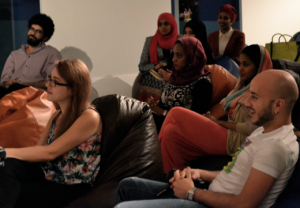Working on a Fulbright-mtvU application for the upcoming February 27 deadline? Attend this week’s webinar on General Q&A this Thursday, January 15, at 2:00 p.m. EST!
In early November, I went to an open mic for local poets at an Abu Dhabi venue called The Space. It was the fourth event in a new Rooftop Rhythms series for Arabic poetry, organized by Rooftops founder Dorian “Paul D” Rogers. The event featured about fifteen poets, who combined elements of Arabic poetry with spoken word. They were multilingual UAE residents from a variety of Arab backgrounds—Palestinian, Lebanese, Emirati, and Sudanese. Many were regulars at Rooftop events but usually performed in English. They reminded the audience of this since the connotations of writing poetry differ from one language to another. Arabic poetry is associated with mastery of Classical Arabic and a deep knowledge of the Arabic literary heritage, while spoken word favors poetic prowess that is grounded in lived experience. But the audience was open-minded, receptive to hearing Arabic poetry in a variety of dialects, registers, and styles. The evening had a warm, familial vibe, with listeners snapping fingers supportively from their bean bag chairs.
I chose a poem to feature here that fits neatly into the themes of this blog. It’s by Dubai-based poet Zeina Hashem Beck, written in appreciation of the performative style of Egyptian singer Umm Kulthum (d. 1975). Umm Kulthum is one of the most beloved figures of the Arab world, and the lyrics to her songs are among the most widely memorized of Arabic poems. Zeina’s poem is called “Umm Kulthum or Al-Intithar [Waiting],” (a title that brought to my mind Umm Kulthum’s famous song, “Ana fi Intizarak” [I’m waiting for you]). Zeina is from Tripoli, Lebanon, and studied English Literature at the American University in Beirut. She is an English-language poet, with her work published and forthcoming in over a dozen literary journals, but considers herself a newcomer to Arabic poetry. Her debut poetry collection, To Live in Autumn (The Backwaters Press, 2014), won the 2013 Backwaters Prize and has been recently released. The poems of this collection describe Beirut as she sees it; a city that resembles autumn in its uncertainties and the conflicted feelings it inspires.
A poem for Umm Kulthum – Zeina Hashem Beck from Corinne Stokes on Vimeo.
“Umm Kulthum or Al-Intithar” is about the experience of listening to Umm Kulthum’s songs and the pleasure the listener takes in waiting—in anticipating her vocal entrances and anticipating her repetitions. Zeina tells us that she is drawn to more than the beauty of Umm Kulthum’s voice; she loves the waiting, the repetition, and the audience’s pleasure in both. It’s a kind of waiting that doesn’t expect fruition, that doesn’t bore or burden. Umm Kulthum may call for her beloved but she doesn’t expect him to come right away… both she and her audience revel in waiting. When Zeina listens to the instrumental passages that precede Umm Kulthum’s vocal entrances, she feels like time waits, too, pushing away the mundane while they listen together. When she listens to Umm Kulthum’s repetitions, she imagines entering her repeated phrases and staying trapped within them, as if they are written in circles rather than horizontal lines. And as she listens, Zeina can see the man who is whistling and calling for Umm Kulthum to repeat her verses. He’s familiar. Like her, he delights in waiting.
As Zeina describes, the anticipation of Umm Kulthum’s listeners derives not only from poetic longing and unrequited love, but also from the musical form itself—long instrumental interludes and extensive repetitions. Successful performances of any kind rely on some combination of familiarity and novelty, with repetition an important tool for establishing familiarity. Repetition may come in the form of a refrain or even musical passages that recall past performances. Jazz musicians, for example, often quote other players, positioning themselves within a spectrum of familiar styles. In pop and other contemporary genres, multiple verses are often sung to the same music, and choruses repeat both music and lyrics. Umm Kulthum may repeat a poetic phrase more than a dozen times, but she balances this repetition by varying tone, melody, and ornamentation. In live concerts, Umm Kulthum’s audiences begged for these repetitions, hanging on her ever-changing improvisations and variations on familiar, expressive turns of phrase.
To illustrate Umm Kulthum’s repetition, here are two lines from “Ana fi Intizarak,” whose lyrics were written by Egyptian poet Bayram al Tonsi:
I wish… I wish
ياريت … ياريتI wish I never fell in love
ياريتني عمرى ماحبيت
And here is a transcription of Umm Kulthum performing these lines (3:48 to 4:33 in this clip).
I wish… I wish… I wish… I wish
ياريت … ياريت … ياريت … ياريتI wish… I wish… I wish… I wish
ياريت … ياريت … ياريت … ياريتI wish… I wish… I wish… I wish… I wish
ياريت … ياريت … ياريت … ياريت … ياريتI wish… I wish… I wish… I wish
ياريت … ياريت … ياريت … ياريتI… I wish
يا….. يا ريتI wish… I wish… I wish… I wish
ياريت … ياريت … ياريت … ياريتI wish… I wish
ياريت … ياريتI wish… I wish… I wish I never fell in love
ياريت … ياريتني … ياريتني عمرى ماحبيت
Umm Kulthum begins her twenty-some iterations of “I wish” higher in her vocal range, gradually descending into a cadence that ends on “habeit.”
The particular balance of new and old in Umm Kulthum’s songs sometimes makes her inaccessible to foreigners or to younger generations of Arabic-speakers. I got lost in Umm Kulthum’s songs at first. Some of her performances were over 45 minutes long, with many sections but no repetitive hook to hold onto. But I kept trying until I loved listening. Friends and musicians I knew in Cairo looked at me expectantly when we heard Umm Kulthum on the radio… “you know this song, don’t you?” they asked, or “you know what she’s saying, right?” I knew I had to train my ears to hear what they heard, because I saw how much pleasure they took in listening.
Check out this link for Umm Kulthum songs, pictures, interviews, and articles. And for a sampling of Zeina’s poetry, click here.
To read my posts in Arabic, please visit corinnestokes.com.




No Comments